

Double Bind
Priests and Programmers curated by Adam Jasper
Swiss contribution for the Sharjah Architecture Triennial 2019
Double Bind is a film by U5 created for the Sharjah Architecture Triennial 2019.
DOUBLE BIND, 2019
2019, 25 min, HD
camera & cut: U5
text: Adam Jasper
music composition & narration: Vivian Wang
A journey is a confrontation of expectation with reality. How will the place we visit compare to the images we have formed in our head? Few islands are as evocative as Bali, the famous island in the Indonesian archipelago that was often described as the last paradise. Double Bind documents a trip to Bali as well as the possibility and impossibility of finding an approach to the complex reality of a place.
The film was inspired by the research of the American anthropologist Stephen Lansing, whose work was crucial for a reevaluation - and survival - of the century-old tradition of rice growing on Bali in face of attempts to implement the international Green Revolution on the island in the 1980s.
But Double Bind is not only a study of agriculture, religion, and water. Bali has fascinated artists and anthropologists since the early of the 20th century. Later, surprising connections between the Indonesian island and California on the other side of the globe and the development cybernetics have developed, connections that already began in the 1930s when the anthropologists Margaret Mead and Gregory Bateson studied the structure of Balinese society.
Double Bind tells the story of encounters - and missed encounters - of anthropology and art, of Bali and California, a tale of projections and connections.
(Text by Dora Imhof)
At the invitation of the Sharjah Architecture Triennial 2019, the Swiss contribution was curated by Adam Jasper (ETH Zurich). Priests and Programmers was a collaboration between Swiss architects and artists, Californian scientists and Balinese composers.
Priests and Programmers takes its point of departure from a conflict in the 1980s over the survival of traditional Balinese rice farming, threatened by the industrialization of agriculture. It emerged, thanks to the research of activist scientists like Stephen Lansing, that the traditional irrigation system was functioning as a complex adaptive system with emergent computational properties: An ancient computer, the size of a volcanic island. This delicate infrastructure was built without financial capital, and without a system of centralized control. As such, its survival presents a direct challenge to accounts of economic development that favor corporate and governmental systems of ownership and control.
The contribution consists of an installation in three parts: a haunting video and sound installation (Vivian Wang, Dewa Alit, Singapore / Indonesia, and the artist collective U5, CH), a large scale landscape model, (designed by the same team that won the Golden Lion for Switzerland at the Architecture Biennale in Venice in 2018 – Alessandro Bosshard, Li Tavor and Matthew Van Der Ploeg.) and a robotic installation by Li Tavor and Max Kriegleder. It is installed in an unrestored vegetable market in the heart of Sharjah. In vitrines found within the shops, documents are displayed that corroborate the installation. The project is a potentially transformative example of local collaborations with far-reaching impacts.












